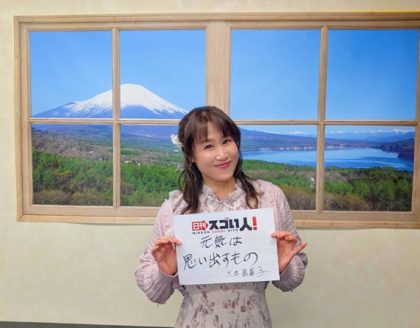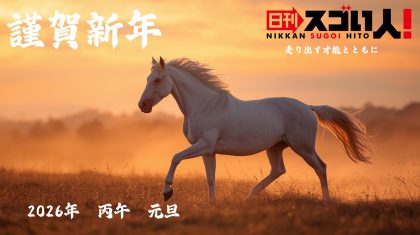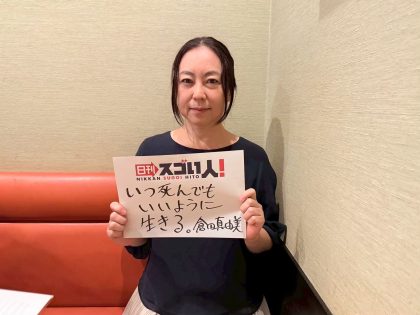Our amazing person for today is a man who, due to his experiences that led to him not attending school for a few years, created the alter-ego robot, Orihime, to help erase loneliness from the world.Mr Ori Yoshifuji, managing director, Ori research laboratory inc. This week we would like to introduce the robot OriHime. It is a ray of light for those living in loneliness and isolation, and its creator continues to battle day and night to create a world free of these problems.This an industry that didn't exist 20 years ago, where one finds themselves working day and night using robotics to find new ways for people that are unable to physically meet with people to form connections to society.As someone who had experienced loneliness as a child, Mr Yoshifuji wished to send a ray of light to all the people still living in loneliness. In this article we hope to show our readers the amazing impact this grand idea has already had for many people.
DAY2 ( read DAY1) Life at an Engineering High School and the life of being judged globally
I: But as a result of that victory you were able to meet your mentor, Professor Kubota, right.
Y: Yes, that's right. Those 3 years I attended engineering high school, were fundamental in developing the me of today. I didn't waste any time. Aside from working hard, I was also able to have some interesting experiences. Of course there were still bad students, and the school had the sort of culture where getting suspended or excluded was seen as a badge of honour.
Naturally this bred bad behaviour, and it made one feel a bit like a heroic fighter.
Not only that, but there were also teachers who were quick to resort to violence.
I wasn't exactly an honour student, but 2 thirds of the students in my year were made to shave their heads as a punishment.
Of course, in the current day and age this would be quite scandalous.
I: Then, because you were a good student, you weren't one of these heroic fighters, right.
Y: Rather, the fact that I didn't get suspended is more a subject of regret (laughs).
It was a once in a life time opportunity, so to speak. So I've always felt like I missed my chance.
The value that we apply to things is dependent on the environment we are in, and so changes easily.
Gaining an expulsion or suspension are viewed as having no value by general society, but in the high school environment, rather than a negative, they actually existed as a good badge of honour.
It's fascinating how the values we apply to different things can vary across the countless different communities on Earth.
During the 3 years I was a hikikomori (Japanese word for a truant or shut in), the environment I was in had a big affect on my values too.
Even as these values change, no-one can say what is actually the true value.
At any specific time, even the person themselves don't know.
I: It seem that you lived a full high school life.
Y: Well, there were some big troubles, and at the time, I myself felt like there were some barriers for me joining the community. So I still suffered from low self esteem until my 3rd year, and still wasn't able to view myself objectively. I wasn't clever, so I had to be reckless, I threw myself into the task of making a great wheel chair to help those who couldn't move by themselves.
After meeting my mentor, I made a wheel chair and started volunteering.
For the purpose of making myself useful, I tried to live my life to help other people, and that in turn became my reason for living.
I wanted to be valued by others and in doing so be able to feel my own self-worth.
I: At that time you were accepted into technical college right.
Y: Yes. I was bad at communication, so despite going to engineering high school and experiencing many new things, I ended up back in the same place thinking that people were troublesome.
There may be friends and high school teachers around, that you can form all sorts of different relationships with, but when you graduate or change classes everything resets. It really has a terrible cost performance ratio (laughs).
I really thought it would be best to make friends with an artificial intelligence, and at technical college that's what I managed.
I: That was your motive?
Y: Well my thoughts changed as time went on.
The me that thought making friends with an artificial intelligence was in a much better environment than when I had wanted to die.
At high-school I was able to take the 3rd place award, and proceed to technical college, it was as though I had undergone social rehabilitation.
It was a much better situation than before.
I have to wonder whether during my Hikikomori days, had I been able to spend time with an artificial intelligence friend and |had long conversations with it, I would be in the same place as today.
If we think along the lines of the idea from earlier about human values changing, the social environment makes people.
That's the difference between different people.
I thought that there a chance that someone who spent too much time around artificial intelligence would never develop as a human.
I: That's right.
Y: That is to say that someone who only speaks to artificial intelligence may take a peculiar developmental direction.
I: You thought about that whilst you were at technical college?
Y: That's right. Even though I was working on artificial intelligence, I didn't believe that it was to reduce loneliness.
Really, I thought that the only way to heal people was through other people.
Even though I avoided meeting people face to face, at the time I thought that I would have to meet people face to face in the future, so there were only 2 options for me.
The first option was to remain at technical college and continue researching.
The research by itself was fascinating.
The other option was to leave school and find another route involving connecting people together.
I: You did have the option to leave technical college.
Y: At that time I remembered the other high school students I met at the ISEF world tournament, and that they had the type of conviction that they were born to research.
Then I thought about what it is that I could accomplish before I die.
Further, I thought about how many more years I had left, and realised how limited my time would be.
My body is weaker than other people's; my eyes are bad, and a doctor had even told me that my sight may not last past 30.
I suddenly realised that I only had 13 years left.
So I decided, for these 13 years, the theme of my life would be removing loneliness from the world.
I: Once you had decided upon that goal, you were able to go to Waseda university?
Y: That's right. Therefore this has become a conversation about whether one should take lots of risks, or do nothing, but in my opinion, it is actually more risky to idle away your hours doing nothing, because that way you'll die without having done anything.
Therefore, now is the time to work earnestly and live as efficiently as possible.
I: Then, what is your current theme?
Y: Loneliness hasn't been erased yet, but if we consider that a different conversation, recently I've been wondering why people go for walks.
I hate walking, but every day I walk quite a bit.
There are some days when walking makes me feel good, but there are also days when it doesn't.
I wonder why that is the case.
I've noticed that on days where my lab coat blows in the wind walking makes me feel good.
My lab coat blowing in the wind, awakens my motivation to walk despite the fact that I generally hate the activity.
Further, what if I could force my lab coat to flutter, if I did make it flutter by myself, I think that I would stop walking.
I: Do you mean the lab coat fluttering even if you didn't walk.
Y: That's right. It fluttering freely, even without me walking. That would be a good feeling.
I: That seems somewhat scary. It has a horror film feel to it.
Y: Laughs
I: Inventors have the image of someone who reduces inconveniences. Their image is connected to innovations that make us more efficient in the short term.
Y: There are a lot of inconveniences in the world, people are really tolerant, putting up with them all (laughs).
Therefore, from now on will be the era of sensitivity, don't you think?
I: Sensitivity?
Y: They can't tolerate nuisances. Once upon a time, a grandmother would wash clothes in the river. Even though it made her knees ache and her hands cold, because she had a high tolerance. She'd work hard every day for her whole life washing clothes in the river, right. (laughs)
I: So it's a demand created from people thinking, “Quick, take her a washing machine?”
Y: That's right. It's connected to the new.
Especially there's often no special reason, people just say, “It's always been that way”, and in that way they'll inherit the hard work and perseverence of the previous generation.
When there is the notion about a new invention, like the washing machine, the next generation will complain about it, and like that innovation occurs, for example removing more dirt from clothes.
I: The hardships of the previous generation get overcome.
Y: Yes. It humanity proceeds in a good direction. It is a well known story, the children of today do not know the hardships of the past generation. That's often said right. I think it's good.
The current generation will come up with new hardships that we ourselves did not notice.
Rather than inheriting hardships, this cycle continues on, and I think it's an important universal truth of humanity.
I: From this cycle new machines and technologies are born, right.
Y: Therefore, it's good to not be persevering the past. It's better to be too sensitive.
Sensitive is best.
If you are sensitive, you'll notice many things.
The same things occur in society too. Why does being born first make someone better than anyone else.
Having a hierarchy is somewhat strange when you think about it.
It's okay if you can feel satisfied in such an environment.
That's the place you fit in.
However, if you feel uncomfortable with it, it's best not to put up with it.
I: Always having doubts, right. If you notice something then you should act.
Y: The latest model of the i-phone is the same, it has more features than previous generations.
If you compare x and 11, 11 is more powerful.
However, in the human world the older generations are greater.
Windows 10 studied and learned from Windows XP.
This is where the difference between humans and computers lies.
If we could hybridise with computers we'd become cyborgs.
Whilst I respect the good old fashioned sense of the older generations, I also admire the high ability of the new generation.
Therefore, the unconditional respect of those the older generations will disappear.
I: I've never thought about that.
(Continue tomorrow)
Editors:ALLES・NORIKO・TIM WENDLAND









